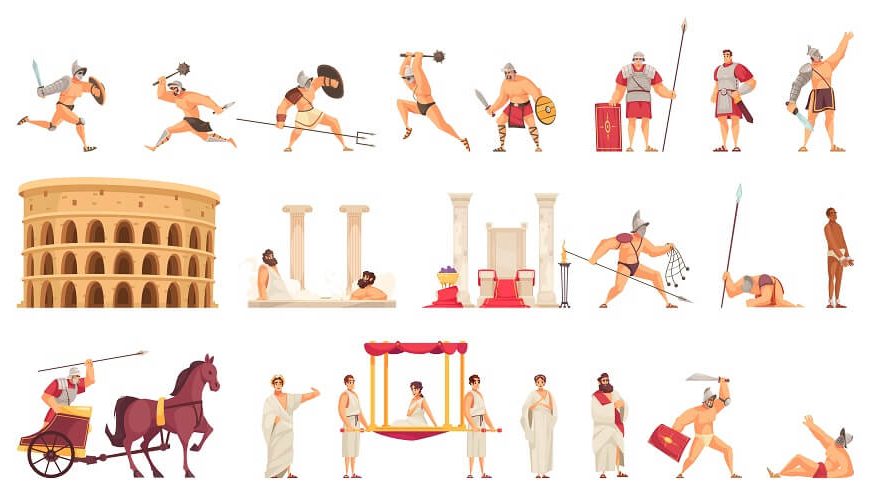The Ancient Olympics: A Journey into Their Origins and Influence
Sporting events have always been integral to human societies, serving as venues for competition, entertainment, and unity. Among these, the Ancient Olympics stand as a pinnacle, embodying more than just games. It was a grand, religious and athletic festival celebrated every four years at Olympia in honor of the Greek god Zeus. Delving into the history of the ancient Olympic games offers an insight into the spirit and culture of the ancient Greek world.
Origin: When Did the Ancient Olympic Games Start?
When tracing the ancient Olympics history, legend attributes the foundation of the Olympic Games to Hercules, the son of Zeus. However, the more grounded historical accounts suggest that the first recorded Olympic Games took place in 776 BC. This inception is derived from inscriptions and records of victors from that era. From then on, the Olympic festival slowly gained significance and widespread attention.
Events in the Ancient Olympic Games
Contrary to the multifaceted competitions we observe today, the ancient Olympic games began as a singular footrace. Over time, other events were introduced:
Stade Race: This was the original event, a short footrace measuring around 190 meters (the length of the stadium).
Dolichos: A long-distance race equivalent to 20 to 24 laps of the stadium.
Pentathlon: An event incorporating five activities: long jump, discus throw, javelin throw, stade race, and wrestling.
Boxing and Wrestling: These were added later, and they weren’t the sanitised versions we’re familiar with today. There were fewer rules, making them more brutal.
Pankration: This was an extreme fighting event combining wrestling and boxing; a lethal combat sport with very few restrictions.
Chariot Racing: Another addition was the hazardous and exhilarating chariot races.
The Spirit and Significance of the Games
The ancient Olympics weren’t merely about physical prowess. Competing in and winning at the Olympic games was an honor, conferring immense prestige on the victor and his city-state. Unlike today’s Olympics, which bring together nations from all over the globe, the ancient Olympic games were primarily a Greek affair. They would herald a temporary truce in any ongoing wars, allowing athletes and spectators to travel safely to Olympia.
The games were deeply rooted in religion. Olympia housed a massive gold and ivory statue of Zeus, one of the Seven Wonders of the Ancient World. Athletes would offer sacrifices and prayers before competing. These rituals underscored the belief that athletic prowess was a gift from the gods and should be dedicated back to them.
Decline and End of the Ancient Olympic Tradition
The ancient Olympics history is as much about its decline as its inception and growth. The decline started with the Romans’ conquest of Greece. The spirit of the games was diluted, and in AD 393, Emperor Theodosius I banned all pagan festivals, including the Olympic Games. This decree marked the end of the ancient Olympic games after nearly 12 centuries of their celebration.
The Socio-Cultural Impact of the Ancient Olympics
The Ancient Olympics were not just a series of athletic events; they were deeply woven into the fabric of ancient Greek society. They were instrumental in creating a unified Greek identity, especially at a time when Greece was not a single unified nation but rather a collection of city-states with often conflicting interests.
Pan-Hellenic Unity
One of the most remarkable aspects of the ancient Olympic games was its ability to foster Panhellenic unity. Every four years, irrespective of ongoing wars or feuds, a sacred truce was declared. This allowed athletes, dignitaries, and spectators from different Greek city-states to travel safely to Olympia. The games thus played an integral role in fostering a shared sense of Greek identity and culture.
Art and Literature
The games also spurred developments in other areas of Greek culture, especially art and literature. Victorious athletes were frequently celebrated in statues and paintings. Many of these artworks were displayed at Olympia, adding to its prestige as a cultural and religious center. Poets, such as Pindar, composed odes honoring Olympic victors, and these became some of the most famous works in ancient Greek literature.
Economic Implications
The influx of visitors to Olympia every four years had significant economic implications. Pilgrims needed places to stay, food to eat, and souvenirs to take back. This led to a boom in local commerce during the Olympic festival. Artisans, innkeepers, food vendors, and many others would have seen substantial business opportunities.
Women in the Ancient Olympics
While the male athletes and their competitions dominated the games, the history of women in the Ancient Olympics is worth noting. Women were generally not allowed to participate or even watch the men’s games. However, there was a separate festival dedicated to the goddess Hera, known as the Heraean Games. This was a women-only event, and its victors were accorded honors similar to their male counterparts in the Olympic Games.
Education and Philosophy
The Olympics also had educational significance. Philosophers and teachers would flock to the games, using the gathering as an opportunity to debate, share ideas, and find new students. Some of the era’s greatest thinkers, like Socrates and Plato, would have been influenced by the discussions and debates taking place on the sidelines of the games.
Incorporating Legacy in Modern Times
While the ancient Olympic games ended, their spirit is still very much alive in the modern Olympics. The emphasis on peace, unity, and the celebration of human potential remains a cornerstone. It serves as a testament to the enduring power of the ideals set forth in Olympia all those millennia ago.
Conclusion
The Ancient Olympics are more than a historical footnote; they are a testament to humanity’s eternal quest for excellence and our need to celebrate it. They signify the unity of the ancient Greek city-states, their shared culture and religious beliefs. From the first footrace in Olympia to the myriad of events that later emerged, these games were a reflection of ancient Greek society’s values, beliefs, and traditions.
As we value ancient traditions that shaped our past, we must also appreciate institutions that mold our future. EuroKids Preschool is a beacon of modern education, ensuring that children step into the world with confidence, much like the ancient athletes stepping onto the fields of Olympia.
Note: This article is a condensed exploration of the Ancient Olympics. Numerous resources delve deeper into the intricate details, culture, and nuances of these historic games.














